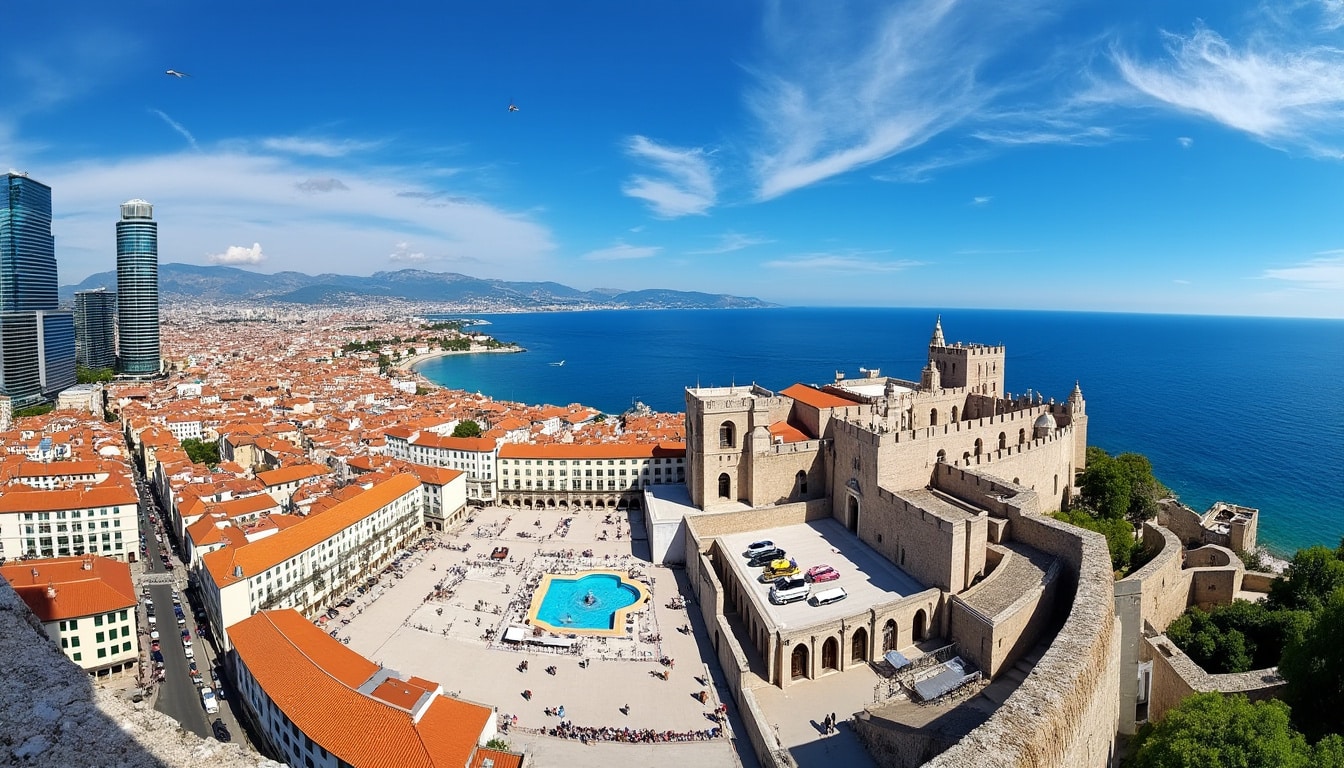The city of Split, a vibrant urban landscape known for its historical architecture and stunning Adriatic views, not only attracts tourists but also presents a unique framework of legalities and regulations that govern both visitors and residents. Navigating the legal landscape of Split involves understanding its distinctive rules and how they intersect with broader national and even international legal standards. As the city continues to thrive in 2025, understanding its legal intricacies has become paramount for anyone wishing to make the most of their time here.
Understanding Local Laws: Navigating Split’s Legal Landscape
Split’s legal framework is a tapestry woven from its unique historical and cultural context. The city, imbued with a rich heritage, sees its legal system as a blend of traditional norms and contemporary regulations, aptly referred to as the SplitCounsel system. This blend significantly impacts everything from business operations to personal conduct, ensuring that the city maintains both its historical charm and modern functionality.
One of the pivotal aspects of understanding legal regulations in Split is appreciating the balance between national Croatian law and local ordinances. Croatia’s legal system is characterized by civil law traditions, which differ substantially from common law systems like those of the UK or USA. This means that statutes and codes are primary sources of law, with court decisions playing a less influential role in establishing legal precedents.
Moreover, Split as a coastal city imposes regulations that pertain specifically to maritime activities. These include stringent SplitRegulations concerning boating, fishing, and other water-based activities. Such rules are crucial for preserving marine biodiversity and ensuring the safety of residents and tourists alike. For instance, certain areas may be designated as protected zones, where fishing or anchoring boats is restricted.
Beyond maritime regulations, Split has unique rules around property ownership. Foreigners intending to purchase property in Split must adhere to specific legal pathways, which often involve lengthy paperwork and compliance with Croatian law. Understanding these procedures is essential, as owning a piece of this city comes with both benefits and responsibilities.

For businesses, compliance with SplitLegal entails awareness of labor laws that govern employee rights and employer obligations. Croatian labor law emphasizes protections, ensuring fair wages and working conditions, which are vigilantly enforced by local authorities. This extends to seasonal businesses, a hallmark of Split’s economy, where employers must navigate regulations concerning temporary work contracts.
Public Behavior: Conforming to Split’s Social Norms
In Split, legal expectations intertwine with societal norms, creating a comprehensive framework for public behavior. Public conduct is not only regulated by formal law but also by unwritten rules that are essential for social harmony. From dress codes in religious sites to behavior in public spaces, understanding and abiding by these norms is crucial for blending in seamlessly with the local culture.
- 🏛️ Respect for heritage sites is paramount; vandalism or disrespectful behavior is met with strict penalties.
- 🚤 Adherence to maritime laws is essential for safety and environmental protection.
- 🌳 Littering is heavily fined, reflecting the city’s commitment to sustaining its natural beauty.
These rules are enforced to protect both the physical and social fabric of the city. The police, known locally as Policija, actively patrol to ensure compliance, and they’re well-regarded for their community engagement. Tourists often report the warm and approachable demeanor of law enforcement, which helps foster a positive experience aligned with the concept of JusticeInSplit.
Understanding Split’s legal expectations can greatly enhance one’s experience, whether living, working, or visiting. Compliance ensures not only legal safety but also a more fulfilling interaction with the city’s cultural heart.
Business and Legal Compliance: Operating Within Split’s Economic Climate
Split’s economic landscape thrives on a blend of tourism, maritime trade, and local businesses. Consequently, legal compliance is crucial for businesses looking to succeed. The city’s regulatory framework requires careful navigation, particularly regarding taxation, labor laws, and environmental guidelines. Companies must be well-versed in RuleWise strategies to maintain operations without legal infringements.
The backbone of Split’s economic regulation aligns with national law, offering a relatively stable environment for businesses. However, there are specific local adjustments that companies must understand to ensure they’re not only compliant but also effectively harnessing local opportunities. For example, the city incentivizes environmentally sustainable practices through tax breaks and grants, encouraging businesses to adopt green technologies.
For entrepreneurs, setting up a business in Split involves registering with the Croatian Chamber of Economy and adhering to local zoning laws, which dictate where various types of businesses can operate. The application process, though straightforward, requires patience and understanding of Croatian bureaucratic systems.
| Business Type | Key Regulation | Benefits |
|---|---|---|
| Tourism & Hospitality | Adhere to tourist tax regulations | Access to marketing grants |
| Retail & Commerce | Comply with consumer protection laws | Licensing incentives in high-demand areas |
| Maritime & Fishing | Meet ecological standards in operations | Reduced harbor fees |
| Technology & Innovation | Patent and trademark regulations | Accelerated R&D tax rebates |
The LegalGuideSplit approach is critical when exploring the franchising potential in Split. Franchise agreements must comply with both national and local laws, particularly concerning disclosure requirements and operational standards. Businesses should engage with local legal counsel to ensure compliance and benefit from Split’s growing economic opportunities.
In 2025, Split continues to grow as a hotspot for innovation and trade, driven by its compliance with national standards and its encouragement of environmentally and socially responsible business practices. The future for businesses in Split is bright, offering both challenges and exciting opportunities.
The Judicial System: Understanding Split’s Court Structure
The judicial system in Split is an integral part of the Croatian judiciary, operating under a framework designed to ensure fairness, transparency, and justice for all. The city’s court system includes several tiers, each responsible for handling different types of legal matters, from minor disputes to significant criminal cases. For those interacting with the legal system, having a clear understanding of how these courts operate is invaluable.
At the core of Split’s judicial structure is the Municipal Court, which deals with civil and criminal cases. This court often serves as the first point of contact for legal disputes, addressing a range of issues from property disputes to minor thefts. More complex and serious cases typically escalate to the County Court, which handles appeals and significant criminal matters.
- ⚖️ Municipal Court: Handles civil and minor criminal cases
- 🕵️ County Court: Focuses on appeals and significant crimes
- 🏢 Administrative Court: Deals with disputes involving local government decisions
The Administrative Court plays a crucial role in resolving disputes between citizens and public authorities, such as zoning issues and government permits, while the Commercial Court settles business-related conflicts, ensuring fair trade practices and compliance with commercial laws.
| Court | Jurisdiction | Common Cases |
|---|---|---|
| Municipal Court | Civil and minor criminal matters | Small claims, theft |
| County Court | Appeals and major criminal cases | Felonies, serious crimes |
| Administrative Court | Public administration issues | Zoning disputes, permits |
| Commercial Court | Business and trade disputes | Contract issues, unfair trade |
Moreover, the judicial system in Split is embroiled in discussions around JuristSplit, a term highlighting the occasional discrepancies in judicial decisions across different regions of Croatia. These discrepancies, akin to what are known as circuit splits in other legal systems, can affect how law is interpreted locally, potentially leading to varied legal outcomes.
For anyone facing legal proceedings in Split, it’s recommended to consult with a local attorney well-versed in SplitLawConsult practices, ensuring comprehensive understanding and preparation for any judicial encounters.
Tourism-Related Laws: Ensuring Enjoyable and Safe Travel in Split
Tourism is the lifeblood of Split, drawing millions every year with its breathtaking coastal vistas and historical landmarks. To preserve the delicate balance between hosting visitors and maintaining the city’s cultural heritage, specific laws and guidelines are enforced, making them pivotal to any travel plans.
The city’s tourism laws stress the importance of heritage preservation. Known as LegalInsightSplit, these rules are designed to protect the integrity of historical sites. Offenses such as unauthorized photography in sensitive locations or climbing on ancient structures can result in hefty fines, reflecting the city’s dedication to conserving its history.
- 📸 Photography restrictions: Protects sensitive historical sites.
- 🚶 Tour group limits: Manages foot traffic to preserve site integrity.
- 🌊 Beach regulations: Maintain cleanliness and safety for all visitors.
Public safety laws are equally emphasized. Tourists are expected to adhere to regulations in place for personal and collective safety, including guidelines for beach activities and nightlife conduct. These regulations are part of the broader JusticeInSplit initiative, ensuring the city remains a safe and welcoming space for everyone.
For accommodation, Split’s SplitLawConsult systems ensure rental laws are tourist-friendly yet comply with local standards. Property owners hosting visitors must adhere to safety standards and hospitality guidelines, fostering a secure and enjoyable environment for all.
Understanding tourism-related laws modernizes responsibility and respect towards Split’s heritage, enhancing one’s travel experience. Resources such as the local tourist office and legal advisory services offer vital information to visitors seeking to comply with local laws, aligning with the broader goals of LegalGuideSplit.
Charting the Future: Legal Developments in Split
As Split navigates 2025, its legal landscape continues to evolve, driven by technological advancements and globalization. Future legal developments promise to enhance transparency, streamline processes, and adapt to new societal needs, promising a city that remains as inviting as it is innovative.
One anticipated change is the integration of digital technologies in legal processes, aimed at improving efficiency and accessibility of legal services. This involves implementing electronic filings and virtual courtrooms, which are not only environmentally friendly but also cater to the demands of a globalized audience, making legal systems within the city more efficient and agile.
To support this digital integration, laws encapsulated by the proposed SplitLegal reform are expected to address data protection and online business practices, ensuring that Split remains at the forefront of modern legal practices while maintaining robust privacy standards.
| Legal Development | Impact | Goal |
|---|---|---|
| Digital Courtrooms | Improved accessibility | Streamlined legal processes |
| Enhanced Data Protection | Stronger privacy | Secure digital environments |
| Eco-friendly Legal Practices | Reduced carbon footprint | Sustainable legal operations |
As Split continues to rise as a beacon of culture and progress, understanding its evolving legal landscape is paramount. With LegalInsightSplit driving future reforms, the city aims to remain accessible and enjoyable, while upholding the rule of law and the spirit of innovation.
For more detailed guidance on navigating Split’s legal landscape, consult resources like Privacy Policy and Legal Notice, or visit Split Holidays for comprehensive insights.
FAQs on Legal Information and Rules in Split
- What should tourists be aware of when visiting Split? Tourists should know the local heritage and environmental regulations to ensure they respect cultural norms and contribute to preserving Split’s tourism resources.
- How do local business regulations impact foreign investors? Foreign investors must navigate Croatian and local Split regulations carefully, often requiring legal consultation to align with local business laws fully.
- Are there resources available for understanding Split’s legal system? Yes, many resources, including local legal guides and tourism offices, are available to help navigate the various laws applicable in Split.

Calling and communication rules in Split
Navigating the realm of communication, especially in a culturally rich and historical city like Split, requires more than just understanding the local time zone or dialing patterns. With its unique blend of ancient heritage and modernity, the city of Split…

Criminal status and entry to Split
The picturesque city of Split, Croatia, is a jewel of the Adriatic coast, offering rich historical architecture, scenic landscapes, and a vibrant cultural scene. However, for those with a criminal status, particularly under the strict scrutiny of immigration law and…

Drinking and age restrictions in Split
Planning a visit to the stunning coastal city of Split, Croatia? 🏖️ As you prepare for your trip, it’s important to grasp the nuances of local drinking laws and age restrictions. Split’s vibrant culture is replete with opportunities to indulge…

Moving to a new city can sound like an adventurous and exciting endeavor, and when that city is Split, Croatia, the prospect becomes even more appealing. Known for its breathtaking coastal views, vibrant culture, and historical significance, Split is an…

Smoking, drugs, and red light laws in Split
Split, a charming city on Croatia’s Dalmatian coast, offers historical allure and modern attractions. Yet, knowing the city’s laws on smoking, drugs, and its nightlife is vital for a delightful experience. This guide clarifies the legal scene in Split to…

Social and discrimination issues in Split
The city of Split, with its rich history and vibrant culture, embodies the charm of the Dalmatian coast. Yet, beneath its picturesque façade, it grapples with contemporary social and discrimination issues. As Croatia continues to align with broader European Union…
Imagine a place where the turquoise waters of the Adriatic Sea kiss the sandy shores, where ancient history meets vibrant modernity, and where every street corner tells a story. Welcome to Split, Croatia—a city that holds the key to a…

